Why has my cat become aggressive?
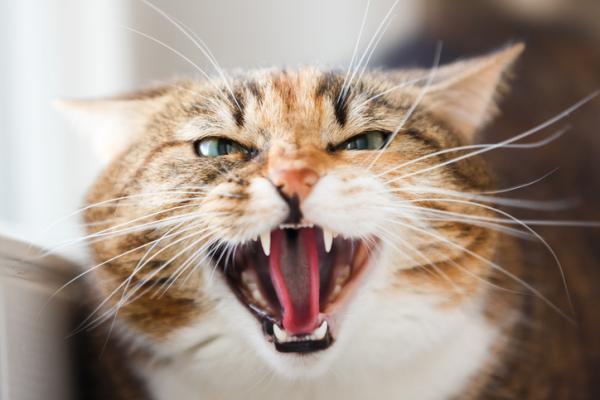
La aggressiveness in cats It is one of the problems for which the veterinary practice is visited more frequently. The first thing you should understand about this is that the feline does not adopt an aggressive attitude by chance or whim, but this always responds to some concrete reasons. That is why he presents you this article about why your cat has become aggressive, where you will find the main reasons that trigger violent attacks and advice on how to deal with these situations. Keep reading!
When can you say that a cat is aggressive?
We speak of aggressiveness when a cat that, usually has a calm behavior, adopts threatening attitudes, being able to attack people, other cats or other pets. Aggression can be just a few warning signs to prevent someone or something from getting close to the cat, or dangerous bites and scratches from the feline.
The aggressiveness of the cat is accompanied by certain signs before the possible attack, which are easy to identify for those who know it. In this sense, it is said that the cat adopts a defensive posture when:
- Encoje your body
- Fix the view
- Your pupils dilate
- The tail is twisted
- The ears are crushed
- The fur bristles
- It hits with the front legs
- Growls
On the contrary, the offensive attitude It manifests in:
- Body and tail raised
- Dominant posture
- Stretched ears
- Bristly coat
- Contracted pupils
- Stare
- Groans and piercing howls
In front of these signs the cat pretends that what threatens it retreats. Otherwise, it will not stop when the time is right to attack. To know how to solve this problem and prevent it from happening to the elderly, with some injured in between, it is necessary to know what causes aggression, so below we detail the most common reasons why a cat becomes aggressive.
The cat has become aggressive due to pain or illness
The main reason why a cat becomes aggressive is because it experiences pain. Usually, cats they are not very expressive when something hurts, so maybe you just realize that something happens when you accidentally touch the area where the reason for your pain is. In this sense, some diseases are very painful, such as arthritis, otitis, peritonitis, dental problems, as well as wounds resulting from a fight with another pet or an accident during a game or a hunt, and abscesses, that also produce severe inflammation.
Diseases such as hypothyroidism, whose symptoms are not usually so evident, also generate problems of aggressiveness in some cats, which will require thorough thyroid tests. Similarly, some conditions do not cause pain, such as neurological problems, feline leukemia, rabies, among others, but the cat will become violent as part of the effect they produce, or as a way to prevent them from approaching him when he feels more vulnerable.
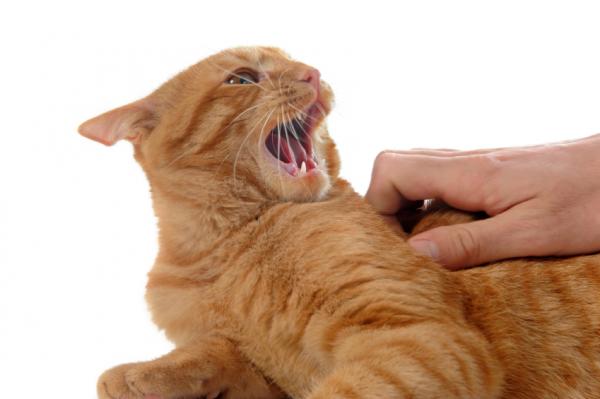
Feel fear
The fear in the cat is caused by situations that make him feel threatened, before which can hide or become violent. In general, a well-socialized cat should not feel afraid of normal stimuli in his environment, such as the sound of a horn or the arrival of a home visit. However, new sounds and smells, as well as unknown pets, can unleash an attitude of suspicion, especially if you associate these unknown stimuli with negative experiences (a pet with which you have fought, for example). Also, approaching them from behind, unforeseen sounds and sudden movements can scare and make you attack, but as a reflex action.
Aggression by bad socialization
Socialization is very important for cats, because it allows them to obtain information about how they should behave in certain situations. Kittens receive the first lessons on socialization of his mother and the brothers of the litter, with those who learn how to hunt, how to play and how to react to the different stimuli that arise. This is why feral cats are so distrustful of human beings: man is not among the stimuli to which he was exposed as a child, or when he did it was always in situations that caused him fear or caused him harm. In general, this cause occurs when the cat has become aggressive with unknown persons or other animals, and not so much with the usual members of the household.
If you rescue a very small kitten, it is best that from the beginning you allow him to meet other people and animals, in addition to reassuring him when he is frightened by sounds that are common in the area where you live, so that he can remain calm at all times . For more information, see our article on “How to socialize a puppy cat”.
Protection of the litter
The cats are very jealous with the puppies of their litter, especially the first weeks, so they will not like you to try to touch or charge at minimums, so trying to do so may cause you to take the claws against you, as it will do everything possible to protect your children from any threat.
Do not worry, when this is the reason for the aggressiveness, the cat calms down with the passing of days, so the best thing you can do is to ensure that the feline family does not lack anything or is in danger, and approach them discreetly so they are calm.
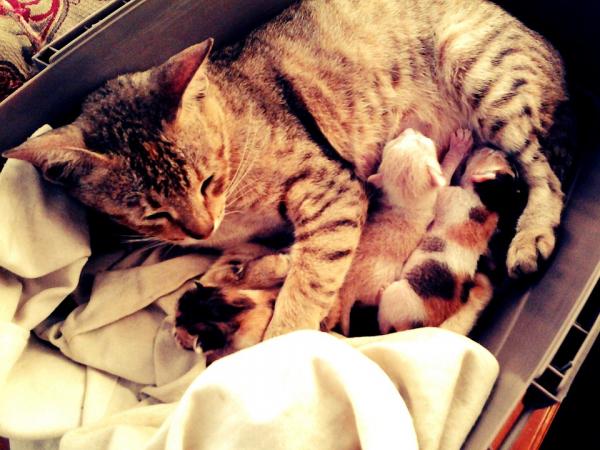
He does not want to be hugged
Embrace, load and caress a cat is a temptation for many, how not to do it, to see it so tender and hairy? However, for felines it is very important to have their own space, and do not feel overwhelmed or dominated. That’s why it’s so common that, when you’ve decided to snuggle by your side or on your knees, I suddenly bite you if you spend too much time caressing it. So, in this case it’s not that the cat has suddenly become aggressive, but simply that you respect its tranquility.
The most important thing is to know when your cat has started to get annoyed or uncomfortable with your caresses, since it will send you several warnings before deciding to bite or scratch you. If you notice it excessively awake, instead of relaxed, with the ears flattened and with the tail going up and down in a somewhat irritated way, it is best to stop your session of caresses if you do not want to take a scratch. Do not miss our article on the body language of cats and discover more about the meaning of their movements.
Has the cat become aggressive or playing?
Especially in cats that do not have other feline companions at home, playing can become the only way the cat has to drain all its energy and put into practice your hunter instinct.
When they meet their mother, the kittens learn to hunt with her through the game, but in those felines that have been orphaned this possibility does not exist, making it more difficult for them to know when they should limit the use of their teeth and the claws when they are having fun. In addition, while the cat is a puppy, many times we find the attempts to bite and scratch fun to be funny, but as this behavior grows it becomes annoying, because the claws and teeth are those of an adult, capable of doing harm. Likewise, on many occasions we are the ones who promote this behavior, playing with him to bite our hands. As we said, during the puppy stage we do not feel any pain, however, with this type of games he interprets that he has total freedom to “hunt” our hands and bite when he wants to play, damaging us as adults and making us believe that he has become aggressive.
He wants to protect his territory
The character of cats is as varied as the combinations that adorn their fur. Some are calmer, others more hyperactive, others more intolerant. A sweet cat with human beings can be, in turn, very territorial when it comes to allowing other pets to approach what they consider “their territory”, which brings quite violent attitudes.
When the cat wants to defend its territory, adopts a defense stance, shrieking and maullandor in a threatening way, because with these sounds it tries to intimidate the possible intruders. Among males, it is usually common during the estrus stages, because not only do they want to protect their own territory but also ensure mating.
The attacked animal decides to retire or not, but this becomes a hard problem of coexistence when the victim is another of the pets of the home. Although in general this aggressiveness is directed to other felines, and can lead to a fight, it is also possible that it is presented against dogs and even against certain people.
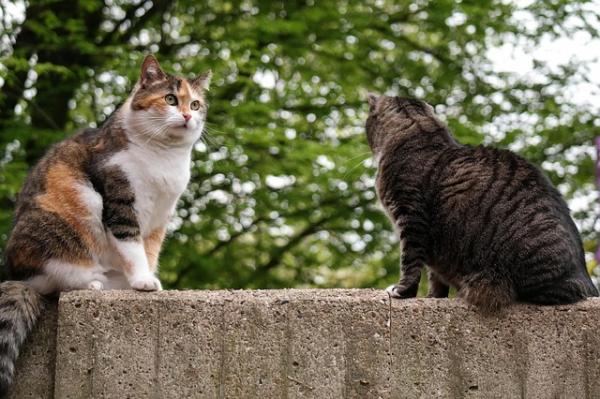
The cat has become aggressive because of your actions
Sometimes you yourself are the culprit that the cat has adopted aggressive behavior, without you knowing that you have contributed to it. If ever, before a violent attitude, you have tried to calm him down with food, love or even leaving him alone, you may teach him that, when he repeats the aggressiveness, he will receive some of these things that are beneficial for him.
Also, when you scold or assault (which you should NEVER do) the feline violence increases, predisposing it against you and against the action that has unleashed its violence (a bath, for example).
Aggression without known cause or redirected
Sometimes it is possible that the cat can not release its aggressiveness towards the object that produces it, so it attacks the first thing that is in its way. It usually happens when the cat sees or smells something or someone that bothers him (another cat that is outside his house, for example) and can not attack him because he has no way out, so when you approach him he throws himself at you, or on some object that is nearby. The action is detonated by a reflection, product of accumulated anger.
When the aggressiveness is not due to any of the reasons mentioned above, and it is not possible to define why the cat has become aggressive, it is said that the origin is unknown. It is the most difficult to fight, because you can not be sure when it will be unleashed, nor what stimuli should be avoided to prevent this behavior.
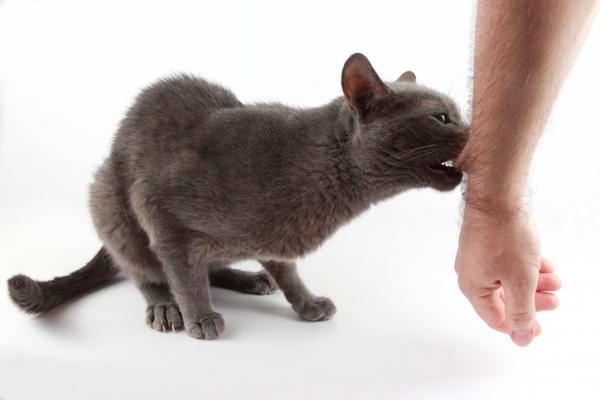
What to do when a cat is aggressive?
Faced with an aggressive outburst, it adopts the following measures:
- Do not try to touch the cat or carry it.
- Do not scold, hit or shout.
- Take a towel and put it on the feline, load it in this way and place it inside a kennel or animal carrier until it calms down. From this shelter you can observe it more calmly and detect some superficial wound. It also works to get away from him until he calms down.
- Before aggressive cats by hormones, consider sterilization or castration.
- To accustom him to a new member of the family, try sensitization therapies, which consist of bringing both animals gradually, always under supervision, so that they get used to the smell of each other and in neutral territory.
- In young cats, socialization starts from the 3 weeks of life.
- Give your cat toys, scrapers and interesting activities with which you can exercise. You will also need a space where you can be alone, either a bed or a simple cardboard box.
- In homes with many pets, the number of sanitary beds, beds and feeders increases, thus avoiding rivalries.
- Vaccine to the feline against rabies and other diseases.
- Reward positive behavior.
- Try to detect the reason for the aggressiveness. Go to your veterinarian for better advice.
And if none of these tips work and, therefore, your cat is still aggressive, do not hesitate go to a feline ethologist to examine it and treat it properly.
If you want to read more articles similar to Why has my cat become aggressive?, we recommend that you enter in our behavior problems section.


